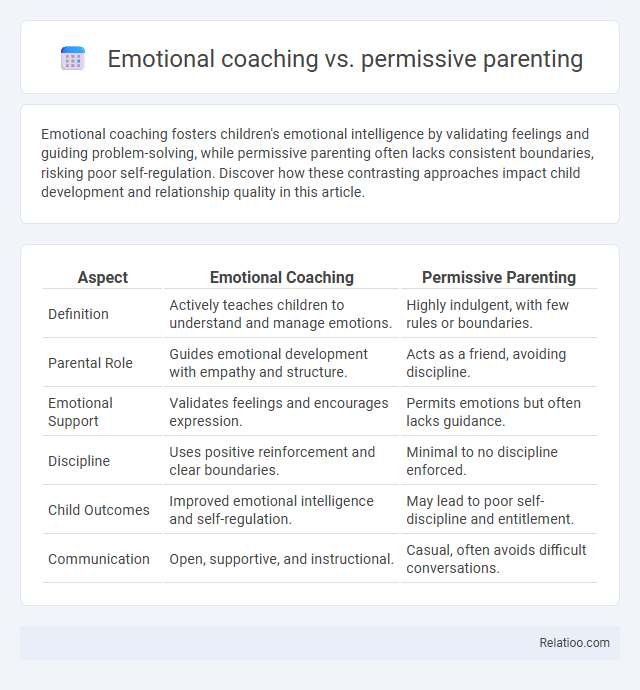Emotional coaching fosters children's emotional intelligence by validating feelings and guiding problem-solving, while permissive parenting often lacks consistent boundaries, risking poor self-regulation. Discover how these contrasting approaches impact child development and relationship quality in this article.
Table of Comparison
| Aspect | Emotional Coaching | Permissive Parenting |
|---|---|---|
| Definition | Actively teaches children to understand and manage emotions. | Highly indulgent, with few rules or boundaries. |
| Parental Role | Guides emotional development with empathy and structure. | Acts as a friend, avoiding discipline. |
| Emotional Support | Validates feelings and encourages expression. | Permits emotions but often lacks guidance. |
| Discipline | Uses positive reinforcement and clear boundaries. | Minimal to no discipline enforced. |
| Child Outcomes | Improved emotional intelligence and self-regulation. | May lead to poor self-discipline and entitlement. |
| Communication | Open, supportive, and instructional. | Casual, often avoids difficult conversations. |
Understanding Emotional Coaching
Emotional coaching involves recognizing and validating your child's feelings while guiding them to manage emotions constructively, contrasting sharply with permissive parenting, which often avoids setting boundaries or addressing emotional regulation. Understanding emotional coaching empowers you to build your child's emotional intelligence by responding empathetically and teaching coping skills rather than acquiescing to every demand. This approach fosters resilience and self-awareness, helping children develop healthy emotional habits that permissive parenting might undermine.
Defining Permissive Parenting
Permissive parenting is characterized by high responsiveness with low demands, where parents set few boundaries and enforce minimal discipline, often prioritizing the child's freedom over structure. Unlike emotional coaching, which involves guiding children to understand and regulate their emotions effectively, permissive parenting may lead to challenges in emotional regulation and behavioral control. You can foster healthier emotional development by balancing empathy with clear expectations, avoiding the pitfalls of permissive parenting.
Key Principles of Emotional Coaching
Emotional coaching centers on recognizing, validating, and guiding a child's feelings to foster emotional intelligence and resilience, differing significantly from permissive parenting, which often lacks consistent boundaries and discipline. Key principles of emotional coaching include active listening, empathy, and teaching problem-solving skills, helping Your child navigate emotions constructively. This approach promotes balanced emotional development rather than unchecked permissiveness or neglecting feelings altogether.
Traits of Permissive Parenting Style
Permissive parenting is characterized by a high level of warmth and low discipline, often resulting in inconsistent boundaries and limited structure for children. Traits include a tendency to avoid confrontation, allowing children significant autonomy, and prioritizing their happiness over setting firm rules. You may notice that permissive parents struggle to enforce consequences, which can impact a child's ability to develop self-regulation and responsibility.
Emotional Coaching: Benefits for Child Development
Emotional coaching empowers your child to recognize, understand, and manage their emotions effectively, fostering resilience and empathy. Unlike permissive parenting, which may lack boundaries, emotional coaching provides structure while validating feelings, promoting healthy emotional regulation and social skills. This approach supports long-term psychological well-being by strengthening your child's emotional intelligence and problem-solving abilities.
Effects of Permissive Parenting on Children
Permissive parenting often leads to children exhibiting lower self-discipline, increased behavioral problems, and difficulty managing emotions due to a lack of clear boundaries and expectations. In contrast, emotional coaching supports children in recognizing and regulating their feelings, promoting better emotional resilience and social competence. Research indicates that permissive parenting can hinder the development of emotional regulation skills, whereas emotional coaching fosters healthier psychological outcomes and stronger parent-child relationships.
Emotional Regulation: Coaching vs Permissiveness
Emotional coaching fosters emotional regulation by guiding Your child to recognize, understand, and manage their feelings, promoting resilience and self-control. In contrast, permissive parenting often neglects setting boundaries, leading to challenges in emotional regulation due to a lack of structure and guidance. Emotional coaching balances empathy with discipline, ensuring Your child's emotional development is supported in a healthy, constructive manner.
Parent-Child Communication Differences
Emotional coaching fosters open parent-child communication by encouraging children to express feelings and validating their emotions, leading to improved emotional intelligence and problem-solving skills. Permissive parenting often results in inconsistent communication, where children's feelings are accepted without guidance or boundaries, potentially causing confusion and lack of emotional regulation. In contrast, emotional coaching combines empathy with clear limits, promoting secure attachment and effective dialogue between parents and children.
Long-Term Outcomes: Emotional Coaching vs Permissive Parenting
Emotional coaching promotes long-term emotional intelligence by teaching children to understand and regulate their feelings, leading to better social skills, academic performance, and mental health. Permissive parenting often results in poor self-discipline and increased behavioral problems, as children may lack boundaries and emotional regulation guidance. Your choice of emotional coaching over permissive parenting shapes healthier emotional development and resilience in adulthood.
Choosing the Right Approach for Positive Parenting
Emotional coaching fosters healthy emotional development by guiding children to understand and manage their feelings, while permissive parenting often lacks boundaries, leading to potential behavioral issues. Choosing emotional coaching over permissive tactics promotes resilience, self-regulation, and secure attachment in children, essential for positive parenting outcomes. Integrating consistent emotional support with firm but empathetic limits creates an optimal environment for growth and emotional intelligence.

Infographic: Emotional coaching vs Permissive parenting
 relatioo.com
relatioo.com